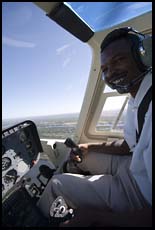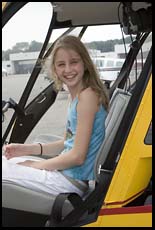The Flight Level 005 Prize for Young Aviators
Site Home : Flying : One Article

The Flight Level 005 Prize encourages young people interested in aviation. Up to
20 people can receive the Prize in any one year. Recipients of the award
will receive the following:
- a one-hour introductory hands-on-the-controls helicopter lesson
- an introductory airplane flight (possibly with some time on the controls)
- ground school
- tours of a variety of aviation facilities and businesses, including
an air traffic control tower, a flight school, a charter operation, and
a maintenance shop
- information on career possibilities in aviation and advice from
successful pilots, mechanics, and business owners
- awards dinner with local pilots and experts
The Prize will be awarded during a weekend at Hanscom Field (KBED).
Eligibility
Applicants for the Prize should be between the ages of 12 and 18 years
old on the date of the awards dinner (see Schedule below). The Prize is
open to young people living in any part of the world.
The Helicopters
Prize winners will be flying in either a
Robinson R44 helicopter or a Robinson
R22. These are the world's best-selling helicopters right now, with
about 800 coming off the assembly line in Torrance, California every
year.

Who does the flying?
You do! You will learn how to start up and test the machine. One of
our experienced instructors will handle lifting the helicopter into a
hover and taking off from Hanscom Field. The instructor will give you
the controls one at a time while the helicopter is in mid-air. Upon
returning back to the airport, you will begin to learn to hold the
helicopter in a hover, taking first the pedals, then the collective and
pedals, and finally all three controls (this is where things often get
interesting).
Depending on which airplane you're flying and with whom, you may get
some "stick time" on your airplane flight.
How to Apply
The Prize was established to encourage young people to learn about
aviation, which includes learning the following: some basic physics and
mathematics, aerodynamics, federal aviation regulations, radio
communications, and how airports are organized.
The Prize will be awarded to young people who take the initiative to
educate themselves to the level that we expect of helicopter students
going through a self-study ground school program at East Coast Aero Club. Nearly all of
the required materials are available free online.
The successful applicant will have read the following publications:
- Pilot's
Handbook of Aeronautical Knowledge (free online from the FAA)
- Rotorcraft Flying Handbook and Airplane Flying Handbook
(free in PDF format from the
faa.gov Web site; also available in hardcopy at flight schools and bookstores)
- See How It Flies, a free
online textbook by John S. Denker, a Ph.D. physicist and flight instructor
- Aeronautical Information Manual (free
online and also available in bookstores as part of "FAR/AIM")
- Federal Aviation Regulations, Parts 61 and 91. (free
online and also in bookstores as part of "FAR/AIM")
[Note that these constitute substantially all of the ground study that
you would have to do in order to earn a Private Pilot Certificate.]
After reading the section on radio communications in the
Aeronautical Information Manual, you should have listened
to Hanscom Tower on liveatc.net and
be prepared to work with air traffic control by talking on the radio.
You should be able to answer most of the questions from the Private
Pilot Airmen Knowledge Test Questions (visit http://www.faa.gov/education_research/testing/airmen/test_questions/
and click on "Private").
When you think that you are ready to apply, please email philg@mit.edu to request the
written examinations that we use for our helicopter students. Once you
return the exams to him (typewritten or handwritten answers are okay,
but if you write by hand, please scan and email), he will contact you
to ask some additional questions. He may also ask you to write a
one-page essay on the topic of "Why I am interested in aviation."
Schedule
For 2008, the Prizes will be awarded on Saturday, June 21.
- Friday afternoon (June 20, 2008): tour of Linear Air charter
operation and East Coast Aero Club maintenance facility
- Friday evening: group dinner and introductions
- Saturday morning: SFAR 73 ground awareness training, helicopter
aerodynamics discussion
- Saturday afternoon: helicopter and airplane flights begin and
continue through Sunday afternoon
- Saturday afternoon: tour Hanscom Field control tower tour
- Saturday evening: awards dinner
- Sunday morning: tour East Coast Aero Club flight school
- Sunday afternoon: tour Jet
Aviation fixed-based operator (FBO)
Award winners, if not living in the Boston area, are responsible for
getting themselves to Hanscom Field and for lodging expenses, if any.
We provide lunch and dinner every day.
Can I Bring My Mom?
Your parents are welcome at the dinners (at a separate table!) and in
the classroom. There won't be enough space for them on most of the
tours. Our insurance does not allow passengers in the back seat of the
R44 helicopter during flight instruction, so they will have to stay on
the ground unless they want to book a flying lesson with one of the two
flight schools at Hanscom Field (we have 40 rental aircraft and more
than 50 instructors at the airport).
Should I Prepare With A Simulator?
Desktop flight simulators are a very time-inefficient way to build
visual flying proficiency, but they are helpful and don't cost anything
to run. People with experience flying helicopters in simulators have a
slightly easier time controlling a real helicopter.
Proficiency with radio-controlled (RC) helicopters can be very helpful.
Some people who are accomplished RC helicopter pilots can hold a hover
in a real helicopter on their first try.
If you are interested in flight simulators or RC helicopters, by all
means come prepared with that experience. If not, don't worry because
you'll probably catch up very quickly.
Why Learn About Aviation?
Flying will challenge your mind, your emotions, and your coordination
skills. Flying will introduce you to some of the world's most
interesting and accomplished people. Flying can provide a satisfying
career in an industry that has been steadily growing for more than 100
years; it is rare that you can get paid to do something that you love
(admittedly you would get paid more to work at a variety of other jobs).
Learning to fly provides a great motivation to learn mathematics and
physics.
People
Philip Greenspun, Airline Transport Pilot and Flight Instructor
(airplanes and helicopters). Started flying in 2001. Massachusetts
Institute of Technology Class of 1982. Used to be a computer programmer,
but trying to recover. (more)
Everyone Else
Richard Amster, Airline Transport Pilot. Started flying in 1983.
Massachusetts Institute of Technology Class of 1982.
Brett Bethke, Private Pilot with Instrument Rating. Started flying in
2005. Ph.D. student in Aeronautical Engineering at the Massachusetts
Institute of Technology.
Paul Cantrell, Airplane Pilot and Helicopter Instructor. Started flying
in 1985 and has more than 3200 helicopter hours. Currently the most
experienced active helicopter instructor in New England.
Adam Harris, Commercial Pilot and Flight Instructor. Started flying in
1990. Holder of Airframe and Powerplant as well as Inspection
Authorization FAA certificates for aircraft maintenance. Head of
Maintenance at East Coast Aero Club. With only the tools and parts in
the trunk of his car, can fix anything. Anything.
Brad Pretzer, Airline Transport Pilot and Flight Instructor. Started
flying in 1992. Day job: flying a Boeing 767 to Japan, Europe, and the Middle
East. After hours: Helicopter pilot. Michigan Technological University
Class of 1998. (more)
Mike Rhodes, Airline Transport Pilot and Flight Instructor (helicopters
and airplanes). Started flying in 1981. Mild-mannered engineer by day.
David Wihl. Private Pilot with Instrument Rating. Started flying in
1986. Founder and CEO of Soft
Artisans.
Why?
We're all pilots and/or instructors at Hanscom and we enjoy introducing
new people, especially young folks, to the challenges and pleasures of
flying. Some of us have seen how math and physics are taught in public
schools and thought that there must be a better way to motivate students
than saying "you need to learn this so that you can get into a good
college."
philg@mit.edu

